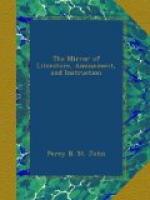Many is the milliner’s apprentice whom every London season sends to her grave, because the dresses of fine ladies must be completed with a degree of celerity which nothing but night-labour can accomplish. To the question, “When must it be done?” “Immediately;” is the readiest answer; though it is an answer which would perhaps be less inconsiderately and indiscriminately given, if it were known how many young creatures have come to a premature death in consequence of it, and how many hearts have been hardened by the oppression which it necessitates. Nor does the evil stop there. The dressmakers’ apprentices in a great city have another alternative; and it is quite as much to escape from the intolerable labours which are imposed upon them in the London season, as from any sexual frailty, that such multitudes of them adopt a vocation which affords some immediate relief, whilst it ensures a doubly fatal termination of their career. The temptations by which these girls are beset might be deemed all-sufficient, without the compulsion by which they are thus as it were, driven out into the streets. Upon them, “the fatal gift of beauty” has been more lavishly bestowed than upon any other class—perhaps not excepting even the aristocracy. They are many of them, probably, the spurious offspring of aristocratical fathers, and inherit beauty for the same reason as the legitimate daughters of aristocrats, because the wealth of these persons enables them to select the most beautiful women either for wives or for concubines. Nor are they wanting in the grace and simplicity of manner which distinguish the aristocracy; whilst constant manual occupation produces in them more vacuity of mind than even that which dissipation causes in their sisters of the superior class. They are thus possessed of exterior attractions, which will at any moment place them in a condition of comparative affluence, and keep them in it so long as those attractions last,—a period beyond which their portion of thought and foresight can scarcely be expected to extend: whilst, on the other hand, they have before them a most bitter and arduous servitude, constant confinement, probably a severe task-mistress (whose mind is harassed and exacerbated by the exigent and thoughtless demands of her employers), and a destruction of health and bloom, which the alternative course of life can scarcely make more certain or more speedy. Goethe was well aware how much light he threw upon the seduction of Margaret, when he made her let fall a hint of discontent at domestic hardships:—




